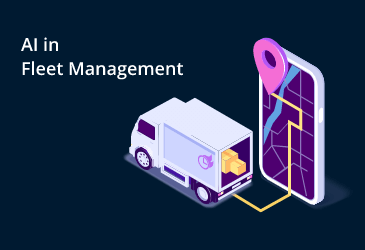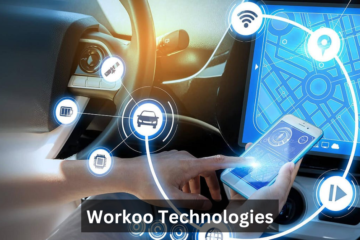Fleet management is set to be revolutionized by Artificial Intelligence (AI) that optimizes logistics and operational excellence invaluable to industries whose core business is moving goods and people. With increasingly growing demand for faster deliveries, customers demand equally improved logistics performance in terms of speed, cost and environment impact which all can now be complemented by AI-driven solutions to transportation fleets. AI’s growing capacity analyze vast amounts of data, predict future outcomes, and automate complex tasks to provide logistics managers the tools to optimize routes, reduce downtime, and improve fuel efficiency. Here’s a breakdown of how AI is making fleet management smarter and more efficient.
- Optimizing Route Planning
Efficient route planning is the best way to get products from one distribution center to another with increase efficiency in flow of materials, minimizing fuel expenditure and delivering products in time. Earlier and with previous modes of possibilities, the fleet managers were using just maps and simple basic traffic information means; in which the routes were not always efficient. AI changes the game by processing real-time and historical data to offer dynamic, optimized routes that consider various factors, such as:
- Traffic patterns: AI can locally and historically analyze traffic patterns and avoid system traffic jams by directing the vehicles to another route.
- Weather conditions: AI enhances the addition of weather details to the database so as to recommend optimal routes, particularly under poor weather conditions.
- Vehicle load and road conditions: Levering AI to analyze the quality of roads and also the ability of the vehicle load for choosing preferable routes which avoid roads that result in wear or roads that are unable to handle certain weights or types of vehicles.
- Reducing Downtime with Predictive Maintenance
By taking advantage of sensors installed on the fleets, AI assists the fleet managers to anticipate and thus avoid mechanical breakdowns. It is another type of predictive approach that can minimize breakdowns while at the same time conduct an early repair on the likely hitches. AI decreases the incidence of unanticipated downtimes, which allows logistics managers to have confidence in their vehicle’s readiness as delivery drivers instead of unscheduled repair jobs that interrupt schedules. You can check your internet connection’s speed at wateen speed test.
- Data analysis from vehicle sensors: Designed AI systems monitor data from components such as engines or brakes and tires to look for some kind of pattern.
- Maintenance scheduling: Consequently, AI is able to schedule maintenance at some times when the vehicle is not being used or at times that will not greatly affect the interim logistics service delivery since the vehicle would always be in proper working condition.
- Fuel Efficiency and Cost Savings
Fuel is a massive part of fleet management expenses, and AI plays a significant role to minimize fuel spend and optimize the consumption index. AI system offer insights and recommendations to optimize fuel usage by analyzing driving patterns, traffic and performance characteristics of a vehicle.
- Driver behavior analysis: AI can keep track of driving habits as frequent stalling, energetic acceleration, or high speed, all of which consume a lot of fuel. AI instructs drivers or the fleet managers, providing tips after monitoring their efficiency standards in using the limited fuel.
- Smart route planning: Through AI, these systems choose the least costly in terms of fuel routes, and this eliminates congested roads, inclines or areas of stagnated traffic.
- Vehicle load optimization: AI ensures that each vehicle carries the right load, reducing the need for multiple trips and maximizing fuel efficiency per journey.
- Streamlining Logistics and Delivery Operations
AI integration is creating a revolution within the logistics by making better fleet scheduling, delivery coordination, and real-time adjustments. In regards to efficiency, AI relieves Fleet managers of routine tasks thus allowing them to concentrate on goal setting.
- Smart dispatching: AI supports the workflow of vehicle routing and driver scheduling, optimizing the setting for delivery, vehicles and drivers. This assist to make optimum use of vehicle and guarantee that they will able to supply on correct time.
- Real-time updates: The AI real time updates on the delivery status is helpful for logistics managers tweaking on demand in the event of delivery delays or disruptions.
- Fleet tracking and coordination: AI improves real-time location of the fleet so that logistics managers can monitor the position of every vehicle, its status and time expected to arrive. This brings efficiency in managing customer experience with the ability to report and resolve issues in real time.
- Improving Performance of the Driver and Safety
AI is also able to enhance drivers’ performance and ensure the safety of fleets operations. By continuously collecting and dissecting data, AI is able to monitor a number of performance indicators. For test ptcl speed test, visit the website.
AI systems track driving behavior indicators, such as, speeding, hard braking and swerving. This data can be useful to fleet managers to decide in which areas drivers should be trained. Features like fatigues, collision signals, and lane departure signals enhance driver assistance in real time and diminishing risk associated with it.
- Fleet Electrification and Energy Management
As more companies move toward electrifying their fleets, AI is taking up the work of managing electric vehicles (EVs). EVs bring up new concerns with battery duration and charging stations as well as the range of an EV; something that AI is quite capable of catering for.
- Range prediction: AI uses data from previous trips, vehicle load, and weather conditions to accurately predict the range of EVs, ensuring that that a vehicle is not left with little power.
- Charging optimization: AI can perform scheduling of the charging EV during the off-peak hours thereby decreasing operational cost.
- Autonomous and Semi-Autonomous Fleet Operations
Although the fully autonomous vehicles are still in their development phases, the auto industry has done a lot in the semi-autonomous technology, and AI plays a crucial role here. Artificial intelligence in vehicle control and safety systems including adaptive cruise control, lane-keeping assistance, and automated braking.
In fleet management, AI-enabled semi-autonomous systems reduce the likelihood of human error, which can lead to accidents or inefficiencies. AI system might take over during heavy traffic to prevent stop-and-go driving, thereby improving fuel efficiency. As autonomous vehicle technology continues to evolve, it will likely become an integral part of fleet management in the auto industry, enabling 24/7 operations without the need for human intervention.
Conclusion
In an industry where efficiency is key to staying competitive, AI’s impact on fleet management is transformative, providing logistics companies with the tools they need to navigate an increasingly complex and fast-paced environment. From predictive maintenance and route optimization to driver safety and EV management, AI is helping logistics companies maximize the performance of their fleets. By automating repetitive tasks, providing real-time insights, and enabling data-driven decision-making, AI allows fleet managers to operate smarter, faster, and more cost-effectively.



